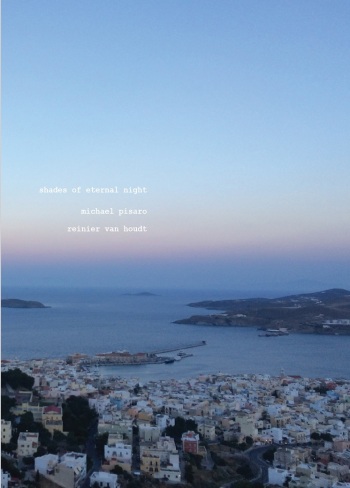 The second of two new releases on Michael Pisaro’s revived Gravity Wave imprint, Shades of Eternal Night is far less startling than its companion piece – Étant donnés, on which Pisaro builds tracks around Curtis Mayfield, John Carpenter, and Dmitri Shostakovich – but the somewhat more familiar pleasures it offers don’t suffer at all from the lack of shock value. Here, Pisaro is also sampling, but his source material is a suite of piano chords recorded by Reinier van Houdt during the 2015 recording sessions for The Earth and the Sky, a 3-disc set of Pisaro’s piano compositions. Similarly to how the various “found” samples of Étant donnés are deployed, Pisaro uses van Houdt’s recordings, alongside field recordings made in Greece and electronic sounds, as building blocks in constructing these pieces.
The second of two new releases on Michael Pisaro’s revived Gravity Wave imprint, Shades of Eternal Night is far less startling than its companion piece – Étant donnés, on which Pisaro builds tracks around Curtis Mayfield, John Carpenter, and Dmitri Shostakovich – but the somewhat more familiar pleasures it offers don’t suffer at all from the lack of shock value. Here, Pisaro is also sampling, but his source material is a suite of piano chords recorded by Reinier van Houdt during the 2015 recording sessions for The Earth and the Sky, a 3-disc set of Pisaro’s piano compositions. Similarly to how the various “found” samples of Étant donnés are deployed, Pisaro uses van Houdt’s recordings, alongside field recordings made in Greece and electronic sounds, as building blocks in constructing these pieces.
The disc is divided into three movements. On the first, “Ghosts of the Site,” whistling high-pitched tones subtly layer and weave through each other, forming eerie, chiming pseudo-melodies as various pure tones fade in and out of the mix. One can occasionally detect hints of what might’ve once been piano harmonics in the more robust tones, or a bit of subterranean rumble that sounds processed and slowed down, warped from whatever its original character was. The “ghost” here might be the piano, or traditional musicality itself, providing just the faintest spectral whisper at the edges of this music’s crystalline purity.
In contrast, “Event Storm” fully embraces the piano’s presence. The piece opens with a hissing, bristling-with-activity nature recording, with insect-like sounds, bird calls, wind, and burbling water mixing together in a way that trends towards white noise. Soon, the piano fades in, dense and reverberating, looped and layered so van Houdt’s clusters become thick clouds of piano harmonics, the individual soundings blurring together. Throughout the piece, the piano fades in and out, juxtaposed against a backdrop of field recordings that are continually shifting subtly but always retain a certain hissy, grayish quality – evoking an overcast day; an uneasy sea; a late autumn field buffeted by wind and peels of thunder.
There’s a foreboding, narrative sensibility to this music that recalls Pisaro’s collaboration with Graham Lambkin on Schwarze Riesenfalter, and not just because of the dramatic piano. It shares with that album the sense of having a story but never telling one. Like Étant donnés, this album is directly inspired by a work of visual art, in this case one of the ten paintings in Cy Twombly’s Fifty Days at Iliam series of paintings. That series is itself a narrative: ten canvases, arranged in sequence like a comic strip, providing an abstracted retelling of The Iliad. The particular piece that inspired Pisaro (during the same museum visit at which he first saw Duchamp’s Étant donnés) is a spartan canvas with a fluffy light gray cloud drifting across its upper half and the title scratched viscerally across the cloud. Pisaro’s melancholy, moody Shades certainly resonates with this visual reference point.
There’s also obvious continuity with many of Pisaro’s other field recording-driven projects, on which a strong sense of place and time is often counterbalanced against the disruptions and additional layers which represent Pisaro’s imposition of his own compositional framework onto the settings he’s mining for sounds. Here, the three impulses – narrative, documentation, and structure – seem especially perfectly balanced, blurring the boundaries between different approaches.
The final track, “The Poem of Names,” opens with rustling, brushing noises of uncertain origin forming a bed for sine tones and what might be heavily processed piano recordings, sometimes chiming like bells, sometimes blurred into sizzling electrical discharge. Even more than on the first track, the piano seems like a ghost here, hovering just out of reach, occasionally heard in those ringing overtones or in snatches of electronically processed ambiance that seem to just faintly have a piano-ish character.
The sounds come and go against a backdrop of silence and stillness; the silences aren’t long but there’s a definite sense of a canvas only partially filled. Frequently, sounds are allowed to reverberate and decay into nothingness. It’s perhaps this quality that most communicates a sense of “piano” in the absence of obvious piano playing. Pisaro uses the piano recordings to impart a sense of natural reverb and the slow decay of notes to electronic sounds and tones. Only in the last few minutes does the piano return overtly, repeating the dense clusters heard on “Event Storm,” with the thickets of sound here almost entirely overwhelming the delicate sine tones winding underneath.
This is yet another complex, beautiful work from Pisaro, and a worthy companion piece to Étant donnés‘ oddity and playfulness. Where that disc reached outward, gleefully pulling in unexpected playmates from other music, Shades of Eternal Night is more introspective, drawing its sounds from Pisaro’s own life and travels, and from one of his most trusted collaborators. The result is gorgeous, haunting music that, though it often seems to be evoking a cloud or a fog, is possessed of the same sublime clarity of ideas that I’ve come to expect from all of this composer’s work.